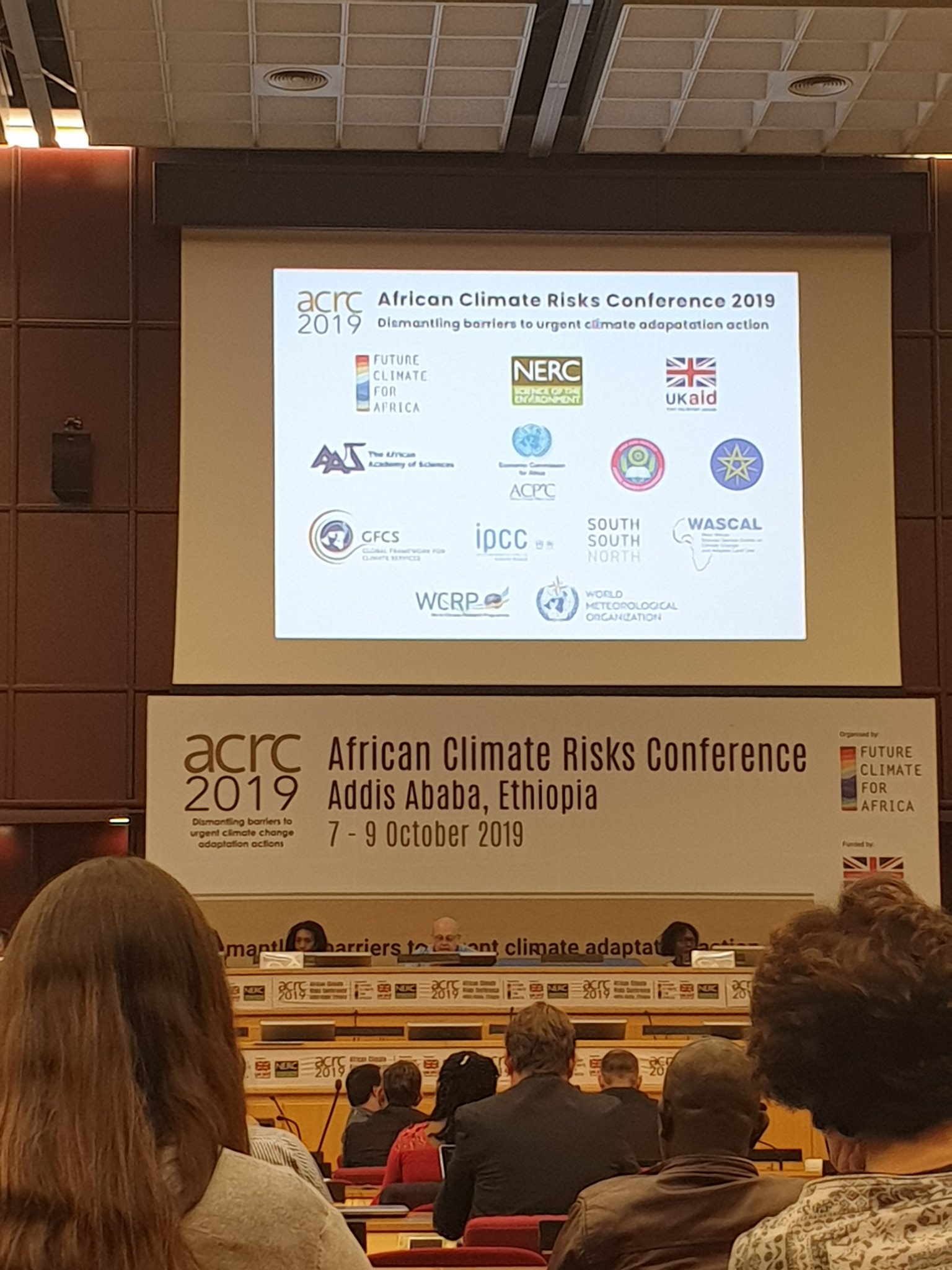 7 - 9 October 2019. Addis Abeba. The African Climate Risks Conference (ACRC) is an open platform for sharing the latest African climate research among researchers, policy makers, practitioners and development partners. The conference was organised by Future Climate for Africa (FCFA) with funding from UKAid and NERC.
7 - 9 October 2019. Addis Abeba. The African Climate Risks Conference (ACRC) is an open platform for sharing the latest African climate research among researchers, policy makers, practitioners and development partners. The conference was organised by Future Climate for Africa (FCFA) with funding from UKAid and NERC.@future_climate ; @acrc2019 ; #acrc2019
The ACRC offered an opportunity to promote the uptake of new data, tools and knowledge; brokering new research collaborations and more targeted donor support. It also stimulated increased contribution of African experts to, and improve coverage of Africa, in the IPCC assessment reports; and bring together development partners to deliberate on how to improve programming to support African-led climate research and service priorities.
- Disseminate results and share insights from new and on-going climate science and adaptation research in Africa;
- Provide a forum to co-identify common priorities in the African climate research for development through African-led collective discussions;
- Contribute to efforts to address barriers to more effective use of climate information to ensure greater impact and legacy of on-going research programmes by promoting the uptake of new data, tools and knowledge within planning and decision-making processes; and
- Link researchers and the diversity of other actors important for moving research into policy and practice: decision-makers, national meteorological agencies, knowledge brokers, donors, NGOs, etc
- Alice McClure Towards theorising rich learning cultures of transdisciplinary research (TDR)
- Bruce Currie-Alder Building climate resilience in Africa & Asia: lessons on membership, organization and collaboration from CARIAA on multi-consortia research programme
- Emmanuel Nyadzi Towards Weather and Climate Services that Integrate Indigenous and Scientific Forecast to Improve Forecast Reliability and Acceptability in Ghana
- Idowu Kunlere Combatting Climate Change in Africa by Strengthening Public Participation: Making Policy Count by Making Every Voice Count
- Inga Menke ISIpedia, the open-access climate impacts encyclopedia: The contribution of stakeholder-scientistdialogue to the development of user friendly climate services
- Neha Mittal Tailoring climate information for African tea
- Richard Graham Forecasts to services: building global regional-national partnerships to strengthen seasonal forecasts and service coproduction for the Greater Horn of Africa
- Richard Jones Climate Risk Narratives: An iterative reflective co-production process for climate knowledge development and integration
- Oluwatoyin Adejonwo-Osho Access to family planning as a pathway to environmental sustainability and as a climate change adaptation tool in Africa
 |
| Lead authors of the @IPCC_CH Special Reports on Land and Ocean share valuable insight with journalists at @cdknetwork |
09/10 Climate services initiatives in Africa
- Mr Asrat Yirgu Senato - Ministry of Environment, Forest and Climate Change, Ethiopia
- Mr Zachary Atheru - Programme Manger, IGAD Climate Prediction and Applications Centre (ICPAC)
- Dr Richard Graham - UK Met Office
- Ms Afroza Mahzabeen - Climate and Resilience Coordinator, Norwegian Refugee Council (NRC)- Norwegian Capacity (NORCAP)
- Dr Kanta Kumari Rigaud - Lead Environmental Specialist, the World Bank
- Ms Chihenyo Kangara - Regional Climate Change and Resilience Specialist, United States Agency for International Development (USAID)
- Ms Daisy Mukarakate - Regional Climate Advisor, United Nations Development Programme
 |
| Suzanne Carter from WISER Transform introduces the Manual on Co-production in African Weather and Climate Services, officially launched the week before in a Co-Production Workshop |
Related:
The key to a co-production approach is bringing together the
producers of weather and climate information with those who use the information to make decisions, often using intermediaries to help connect these actors, in order to solve a problem where weather and climate information is relevant. A number of donors are encouraging the use of co-production to drive further improvements in weather and climate services.
 The manual outlines six building blocks in the co-production process. These building blocks do not need to be followed sequentially. Co-production can be used for different purposes. As a result, co-production can be used in all, or some, building blocks depending on the problem to be addressed. Most research projects will involve users in the identification of research questions but not always in the co-development of solutions step, for example.
The manual outlines six building blocks in the co-production process. These building blocks do not need to be followed sequentially. Co-production can be used for different purposes. As a result, co-production can be used in all, or some, building blocks depending on the problem to be addressed. Most research projects will involve users in the identification of research questions but not always in the co-development of solutions step, for example.


No comments:
Post a Comment